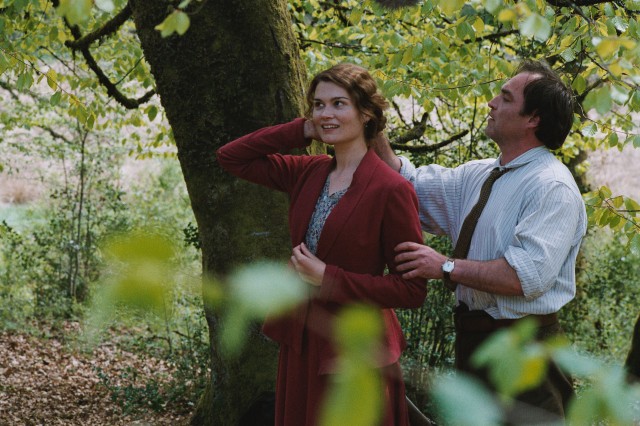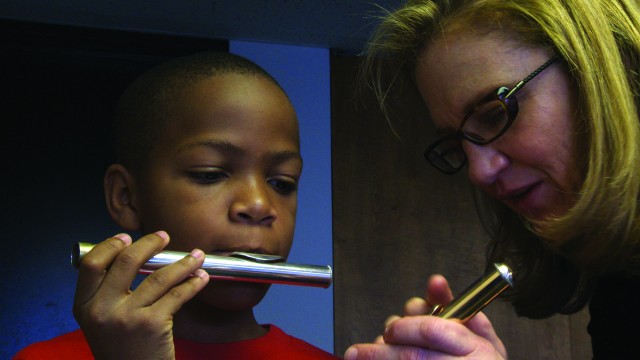
Pete Destil studies the flute with MAP mentor Gretchen Pusch in SOME KIND OF SPARK (photo by Ben Niles)
SOME KIND OF SPARK (Ben Niles, 2014)
SVA Theatre
333 West 23rd St. between Eighth & Ninth Aves.
Sunday, November 16, 2:00
Series runs November 13-20
www.docnyc.net
www.somekindofspark.com
 Ben Niles’s Some Kind of Spark is a heartwarming and heartbreaking documentary about the importance of music education in children’s lives. Niles, whose award-winning 2007 film, Note by Note: The Making of Steinway L1037, detailed the care and craftsmanship that goes into the creation of a grand piano, this time goes inside Juilliard’s Music Advancement Program, “a Saturday instrument instruction program for highly talented children from backgrounds underrepresented in American performing arts.” Niles follows six kids, between the ages of eight and fourteen, as each one is mentored by a member of MAP’s staff of professional musicians during a three-year course. Violist Kara Charles, trombonist Rahman Amer, trumpeter Abdullah Amer (Rahman’s twin brother), flutist Pete Destil, singer and bassist Ami Kone, and percussionist Alejandro Cediel are shown studying with their teachers (including Bill Ruyle and Mike Truesdell on percussion, San San Lee on violin, Gretchen Pusch on flute, Lubima Kalinkova-Shentov on bass, and Paula Bing and Huang Ruo on music theory) and talking to their families about what they’re learning.
Ben Niles’s Some Kind of Spark is a heartwarming and heartbreaking documentary about the importance of music education in children’s lives. Niles, whose award-winning 2007 film, Note by Note: The Making of Steinway L1037, detailed the care and craftsmanship that goes into the creation of a grand piano, this time goes inside Juilliard’s Music Advancement Program, “a Saturday instrument instruction program for highly talented children from backgrounds underrepresented in American performing arts.” Niles follows six kids, between the ages of eight and fourteen, as each one is mentored by a member of MAP’s staff of professional musicians during a three-year course. Violist Kara Charles, trombonist Rahman Amer, trumpeter Abdullah Amer (Rahman’s twin brother), flutist Pete Destil, singer and bassist Ami Kone, and percussionist Alejandro Cediel are shown studying with their teachers (including Bill Ruyle and Mike Truesdell on percussion, San San Lee on violin, Gretchen Pusch on flute, Lubima Kalinkova-Shentov on bass, and Paula Bing and Huang Ruo on music theory) and talking to their families about what they’re learning.
Niles concentrates almost exclusively on the music; he doesn’t delve deep into the kids’ personal lives, the families’ financial situations, or what else the children might be into. The focus is on the playing, on the studying, and, more important, on the practicing. “Make sure you refuse to be the guy who just gets the notes. Do something greater,” mentor Weston Sprott tells Rahman. The most fascinating part of the film centers on Pete and Gretchen; prior to the program, Pete had never even picked up a flute, and Gretchen isn’t afraid to get tough with him if he’s not properly prepared, especially after a summer in which the young boy couldn’t practice at all because he can’t afford his own instrument. The tension builds as the kids decide whether to audition for a third year at MAP, try to make the Juilliard Pre-College Orchestra, or apply to LaGuardia High School of Music & Art and Performing Arts. Some Kind of Spark is a truly inspiring film that never gets overly sentimental, instead revealing, with brutal honesty, the challenges these kids face, because the path they have chosen is not an easy one. But seeing their eyes shine as they experience music in so many different ways makes it all worth it. Some Kind of Spark is having its world premiere November 16 at the SVA Theatre in the Metropolis competition of the fifth annual DOC NYC festival, with Niles, editor Sara Pellegrini, and select cast members present to talk about the film. The festival runs November 13-20 and consists of more than 150 documentaries, panel discussions, and workshops at Bow Tie Chelsea Cinemas, the IFC Center, and the SVA Theatre.
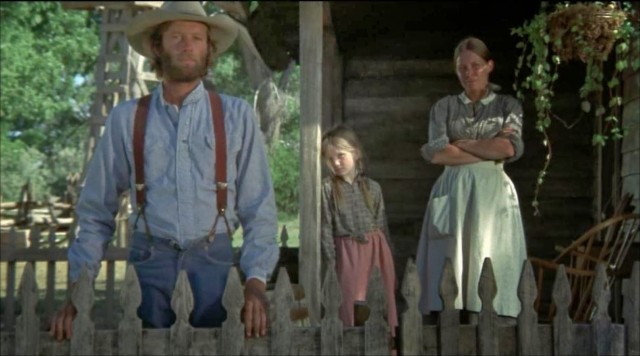
 After many years away from the homestead, Harry Collings (first-time-director Peter Fonda) returns to his farm, only to find that his wife (Verna Bloom) has kept herself rather busy once she assumed he was not coming back, in The Hired Hand, a so-called hippie Western written by Scottish novelist Alan Sharp, who also wrote Ulzana’s Raid and Night Moves. Warren Oates is his usual fine self as Harry’s dedicated sidekick, Arch Harris, as they do battle with the likes of the evil McVey (Severn Darden). The quiet, beautiful Fonda is like a Zen cowboy, trusting in karma to right the world’s wrongs, but that doesn’t always work out. Fonda considers the film, photographed by a young Vilmos Szigmond (McCabe & Mrs. Miller, The Deer Hunter), to be a Greek tragedy within a Western; indeed, it’s a little gem that that goes way beyond the trappings of the genre, laying the groundwork for such later anti-Westerns as Clint Eastwood’s Unforgiven. The film is being shown November 14 as part of the Rubin Museum Cabaret Cinema series “My Formative Years,” curated by artist Francesco Clemente in conjunction with his current solo show, “Inspired by India,” and will be introduced by playwright Neil LaBute. Clemente says about the film, “I’m in favor of psychedelia in all manifestations and to find psychedelia in a Western is always nice when it happens, but it never happens.” The film series continues with Alejandro Jodorowsky’s The Holy Mountain on November 21 and Pier Paolo Pasolini’s Salò, or the 120 Days of Sodom on November 28 (introduced by choreographer Karole Armitage), before concluding with Gianfranco Rosi’s Sacro GRA on December 5.
After many years away from the homestead, Harry Collings (first-time-director Peter Fonda) returns to his farm, only to find that his wife (Verna Bloom) has kept herself rather busy once she assumed he was not coming back, in The Hired Hand, a so-called hippie Western written by Scottish novelist Alan Sharp, who also wrote Ulzana’s Raid and Night Moves. Warren Oates is his usual fine self as Harry’s dedicated sidekick, Arch Harris, as they do battle with the likes of the evil McVey (Severn Darden). The quiet, beautiful Fonda is like a Zen cowboy, trusting in karma to right the world’s wrongs, but that doesn’t always work out. Fonda considers the film, photographed by a young Vilmos Szigmond (McCabe & Mrs. Miller, The Deer Hunter), to be a Greek tragedy within a Western; indeed, it’s a little gem that that goes way beyond the trappings of the genre, laying the groundwork for such later anti-Westerns as Clint Eastwood’s Unforgiven. The film is being shown November 14 as part of the Rubin Museum Cabaret Cinema series “My Formative Years,” curated by artist Francesco Clemente in conjunction with his current solo show, “Inspired by India,” and will be introduced by playwright Neil LaBute. Clemente says about the film, “I’m in favor of psychedelia in all manifestations and to find psychedelia in a Western is always nice when it happens, but it never happens.” The film series continues with Alejandro Jodorowsky’s The Holy Mountain on November 21 and Pier Paolo Pasolini’s Salò, or the 120 Days of Sodom on November 28 (introduced by choreographer Karole Armitage), before concluding with Gianfranco Rosi’s Sacro GRA on December 5.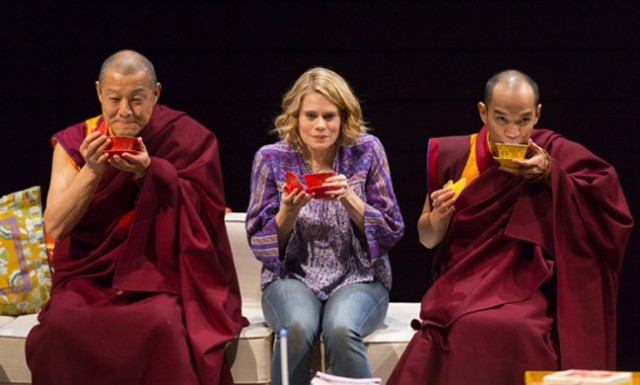
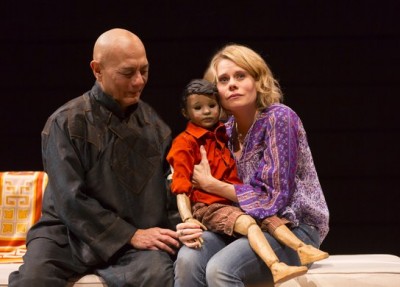
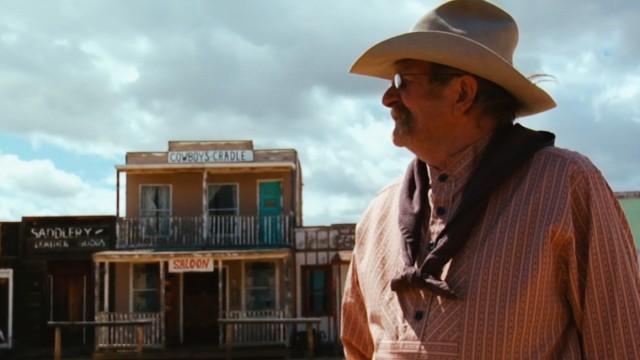
 Brooklyn-based documentarian Andrea B. Scott reveals the soft underbelly of contemporary America in Florence, Arizona, which is having its world premiere this week at the annual DOC NYC festival. Scott heads to the small desert town of Florence in the Grand Canyon State, an area that was a farm community until a nearby 1875 silver boom led to its becoming a more wild West kind of place. Today the town revolves around the prison system; there are twice as many prisoners in Florence as there are residents, and a call to privatize more of the jails is part of the battle for mayor between the New Age-y Lina Austin and former police chief Tom Rankin, both of whom speak openly and honestly with Scott. Scott, who directed, produced, coedited, and photographed the film — which includes gorgeous shots of sunrises and vast landscapes — also meets with prison barber and former inmate Andy Celaya, who remembers the respect ex-cons used to get after serving their time; another former prisoner, young Marcus Seitz, who can’t wait to turn twenty-one so he can work inside the prison, explaining, “That would be pretty cool”; and grizzled prison detention officer Gunny Jackson, who runs the Semper Fi Ranch with his wife, Lois, and considers himself a “dove” who can be “a very vicious man when I want to be; I know how to inflict pain.” Scott also visits the Pinal County Historical Society, which features a section on all of the people who have been executed in Florence’s prisons.
Brooklyn-based documentarian Andrea B. Scott reveals the soft underbelly of contemporary America in Florence, Arizona, which is having its world premiere this week at the annual DOC NYC festival. Scott heads to the small desert town of Florence in the Grand Canyon State, an area that was a farm community until a nearby 1875 silver boom led to its becoming a more wild West kind of place. Today the town revolves around the prison system; there are twice as many prisoners in Florence as there are residents, and a call to privatize more of the jails is part of the battle for mayor between the New Age-y Lina Austin and former police chief Tom Rankin, both of whom speak openly and honestly with Scott. Scott, who directed, produced, coedited, and photographed the film — which includes gorgeous shots of sunrises and vast landscapes — also meets with prison barber and former inmate Andy Celaya, who remembers the respect ex-cons used to get after serving their time; another former prisoner, young Marcus Seitz, who can’t wait to turn twenty-one so he can work inside the prison, explaining, “That would be pretty cool”; and grizzled prison detention officer Gunny Jackson, who runs the Semper Fi Ranch with his wife, Lois, and considers himself a “dove” who can be “a very vicious man when I want to be; I know how to inflict pain.” Scott also visits the Pinal County Historical Society, which features a section on all of the people who have been executed in Florence’s prisons.